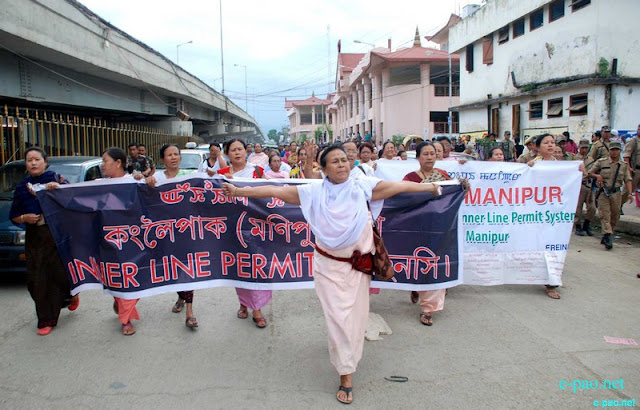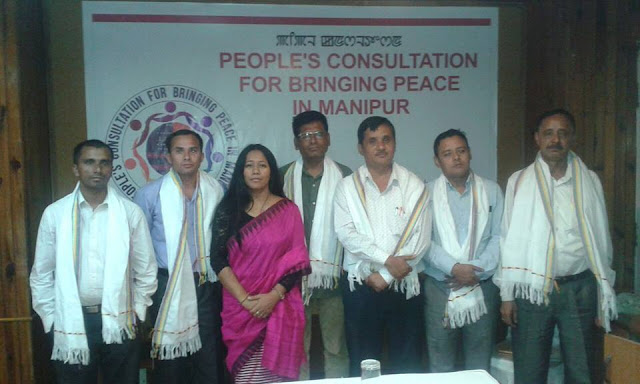KANGPOKPI, Jun 27: The Gorkhas of Manipur today formed a new organization to be the apex body of the Gorkha community in the State to address the grievances and issues related to the Gorkhas and represent the Gorkha community in sharing views and opinions with the new drafting committee on Inner Line Permit System [ILPS].
The newly formed Gorkha organization christened United Gorkha Committee, Manipur was formed during a meeting today at Rose English High School, Kanglatongbi.
Various Gorkha civil bodies including Gorkha women leaders, social workers, politicians, bureaucrats, intellectuals, well-wishers, etc attended the meeting.
The joint meeting of the Gorkhas unanimously resolved to form a coordinating committee to address the grievances and issues of Gorkha community in the State and to follow up the current burning issue of the State.
While it resolved to name the committee as “United Gorkha Committee Manipur” which was reportedly constituted by various Gorkha civil bodies leaders, it also nominated some prominent Gorkha leaders and subsequently elected the office bearers of the newly formed committee.
Hari Prasad Nepal, Bhumi Prasad Vikas and Shiva Kumar Basnet were elected as president, vice president and general secretary respectively while LB Adhikari, Karan Rai, Dillip Bhurtel and Rajen Rai were elected as the joint secretaries.
Another seven persons were nominated as members in the meeting and it was also resolved to nominate members and advisory boards from other places of Gorkha inhabited areas.
Speaking to media persons after the meeting, Hari Prasad Nepal said that the Gorkhas in Manipur have various civil bodies but there is no organization to represent the entire Gorkha community as a whole on any issue so far in the State.
Therefore, UGCM is formed as the apex body of the Gorkhas of Manipur to tackle any issue of the Gorkha community, he added.
Nepal further said that UGCM will also represent the Gorkha community of Manipur in sharing views and opinions with the new drafting committee on ILPS and other current issues of the State while adding that it [UGCM] will address the grievances of the Gorkhas and work for the welfare of the community in the State.
Via thesangaiexpress
The newly formed Gorkha organization christened United Gorkha Committee, Manipur was formed during a meeting today at Rose English High School, Kanglatongbi.
Various Gorkha civil bodies including Gorkha women leaders, social workers, politicians, bureaucrats, intellectuals, well-wishers, etc attended the meeting.
The joint meeting of the Gorkhas unanimously resolved to form a coordinating committee to address the grievances and issues of Gorkha community in the State and to follow up the current burning issue of the State.
 |
| Rally for Inner Line Permit (ILP) by women activists of IMA Market at BT |
Hari Prasad Nepal, Bhumi Prasad Vikas and Shiva Kumar Basnet were elected as president, vice president and general secretary respectively while LB Adhikari, Karan Rai, Dillip Bhurtel and Rajen Rai were elected as the joint secretaries.
Another seven persons were nominated as members in the meeting and it was also resolved to nominate members and advisory boards from other places of Gorkha inhabited areas.
Speaking to media persons after the meeting, Hari Prasad Nepal said that the Gorkhas in Manipur have various civil bodies but there is no organization to represent the entire Gorkha community as a whole on any issue so far in the State.
Therefore, UGCM is formed as the apex body of the Gorkhas of Manipur to tackle any issue of the Gorkha community, he added.
Nepal further said that UGCM will also represent the Gorkha community of Manipur in sharing views and opinions with the new drafting committee on ILPS and other current issues of the State while adding that it [UGCM] will address the grievances of the Gorkhas and work for the welfare of the community in the State.
Via thesangaiexpress









+Avinash+Gurung+at+the+Gorkha+Rangamanch+Bhavan+in+Darjeeling+on+Saturday;+Bimal+and+Asha+Gurung+in+the+audience.+Pictures+by+Suman+Tamang.jpg)


